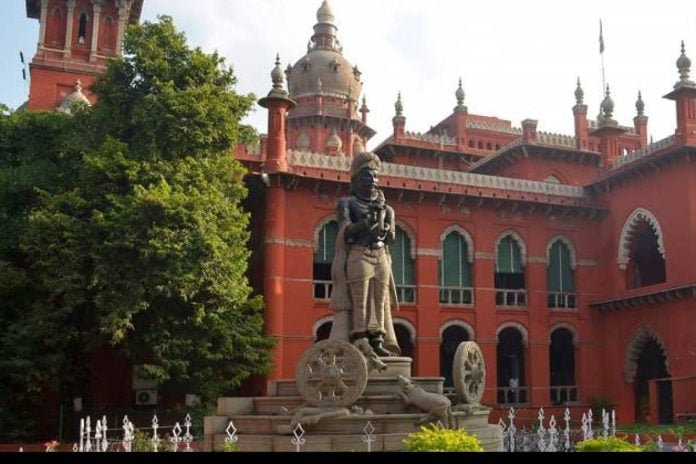The Madras High Court while quashing FIR registered against an Anti CAA protester observed that Police cannot register FIR for the offences under Section 188 of IPC.
The bench headed by Justice GK Ilanthiraiyan was hearing a petition filed by Shamsul Huda Bakavi seeking quashing of proceedings in a case registered against him by the Police under Section 143 and 188 of IPC.
The petitioner along with other accused persons were protesting in the public road against the implementation of the Citizenship Amendment Act and further demanded the Central Government to withdraw the said Citizenship Amendment Act, without getting prior permission from the concerned authority. On the basis of the above-said allegation, the police registered the complaint and filed an FIR against the petitioner and others for the offences under Sections 143 and 188 of IPC.
The Counsel appearing for the petitioner submitted that according to Section 195(1)(a) of Cr.P.C., no Court can take cognizance of an offence under Section 188 of IPC unless the public servant has written order from the authority.
On the other hand, Additional Public Prosecutor appearing for the Police submitted that “Section 188 of IPC is a cognizable offence and therefore it is the duty of the police to register a case. Though there is a bar under Section 195(a)(i) of Cr.P.C. to take cognizance for the offence under Section 188 of IPC, it does not mean that the police cannot register FIR and investigate the case. Moreover, the petitioner is an habitual offender by committing this kind of crimes. Therefore, he vehemently opposed the quash petition and prayed for dismissal of the same.”
The bench however observed that Section 195(1)(a) of the Criminal Procedure Code, 1973 states
“195.Prosecution for contempt of lawful authority of public servants, for offences against public justice and for offences relating to documents given in evidence. (1) No Courts hall take cognizance- (a) (i) of any offence punishable under sections 172 to 188 (both inclusive)of the Indian Penal Code (45 of 1860), or (ii)of any abetment of, attempt to commit, such offence, or (iii) of any criminal conspiracy to commit, such offence, except on the complaint in writing of the public servant concerned or of some other public servant to whom he is administratively subordinate;…”
The Court hence said that it is very clear that for taking cognizance of the offences under Section 188 of IPC, the public servant should lodge a complaint in writing and other than that no Court has power to take cognizance.
The bench further relying on the Judgement in the case of Jeevanandham and others Vs. State rep. by the Inspector of Police, Karur District, noted that the following guidelines have been provided the insofar as an offence under Section 188 of IPC, is concerned:
- A Police Officer cannot register an FIR for any of the offences falling under Section 172 to 188 of IPC.
- A Police Officer by virtue of the powers conferred under Section 41 of Cr.P.C will have the authority to take action under Section 41 of Cr.P.C., when a cognizable offence under Section 188 IPC is committed in his presence or where such action is required, to prevent such person from committing an offence under Section 188 of IPC.
- The role of the Police Officer will be confined only to the preventive action as stipulated under Section 41 of Cr.P.C and immediately thereafter, he has to inform about the same to the public servant concerned/authorised, to enable such public servant to give a complaint in writing before the jurisdictional Magistrate, who shall take cognizance of such complaint on being prima facie satisfied with the requirements of Section 188 of IPC.
- In order to attract the provisions of Section 188 of IPC, the written complaint of the public servant concerned should reflect the following ingredients namely; i) that there must be an order promulgated by the public servant; ii) that such public servant is lawfully empowered to promulgate it; iii) that the person with knowledge of such order and being directed by such order to abstain from doing certain act or to take certain order with certain property in his possession and under his management, has disobeyed; and iv)that such disobedience causes or tends to cause; (a) obstruction, annoyance or risk of it to any person lawfully employed; or (b) danger to human life, health or safety; or (c) a riot or affray.
- The promulgation issued under Section 30(2) of the Police Act, 1861, must satisfy the test of reasonableness and can only be in the nature of a regulatory power and not a blanket power to trifle any democratic dissent of the citizens by the Police.
- The promulgation through which, the order is made known must be by something done openly and in public and private information will not be a promulgation. The order must be notified or published by beat of drum or in a Gazette or published in a newspaper with a wide circulation.
- No Judicial Magistrate should take cognizance of a Final Report when it reflects an offence.
- Under Section 172 to 188 of IPC. An FIR or a Final Report will not become void ab initio insofar as offences other than Section 172 to 188 of IPC and a Final Report can be taken cognizance by the Magistrate insofar as offences not covered under Section 195(1)(a)(i) of Cr.P.C.
- The Director General of Police, Chennai andInspector General of the various Zones are directed to immediately formulate a process by specifically empowering public servants dealing with for an offence under Section 188 of IPC to ensure that there is no delay in filing a written complaint by the public servants concerned under Section 195(1)(a)(i) of Cr.P.C.
Read the Order here;
Shamsul-Huda-Bakavi-v-State-and-ors-India Legal Bureau


